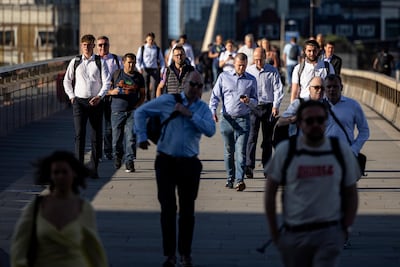Britain's remote working boom could see one in five UK jobs outsourced to other countries with well-paid, white-collar jobs most under threat, the Tony Blair Institute for Global change has said.
The institute, founded by former prime minister Mr Blair, warned that 5.9 million professionals – equivalent to 18 per cent of the UK workforce – who can work “anywhere”, such as graphic designers, accountants, economists and software specialists, are most at risk.
“If left unaddressed, the outsourcing and offshoring of these roles would have political, economic and social consequences similar to the loss of manufacturing jobs in the 1970s but on an accelerated timeframe,” the research group said in a report published on Wednesday.
The warning highlights how the labour market has shifted during the Covid-19 pandemic and how this change could become permanent after the "mass experiment" with remote working showed employers who face cost pressures how a small team may be sufficient for in-office collaboration.
In the past, blue-collar jobs in the manufacturing sector were outsourced or offshored, with professional white-collar roles in London and the south-east of the country, particularly in ICT, financial and professional services, sheltered from the pressures of globalisation, the report found.
However, this changed as the onset of the pandemic led to a sudden shift to working from home.
In a foreword to the report, Mr Blair said that “anywhere jobs” meant that they can be done remotely as efficiently or more efficiently than from normal offices, with government action needed to prevent employers from outsourcing these roles to workers overseas.
“Having put in place the digital infrastructure to make remote working possible, businesses, especially larger ones, are likely to persist with it even after the pandemic in order to reduce overheads, boost productivity and recruit talent from a wider geography,” the report said.
"As a result, they may opt to employ only the core staff required for in-person collaboration and decision-making while outsourcing and offshoring those who are not."
After more than a year of near-empty skyscrapers and virtual conferences, the City of London was hoping the UK government would go ahead with the final stage of its road map out of lockdown on June 21 to kick-start a widespread return to the office.
Banks including Goldman Sachs Group and JP Morgan Chase told UK-based staff to prepare for a gradual return to office, but those plans were scuppered after Prime Minister Boris Johnson extended the remaining restrictions by four weeks.
Cabinet Office Minister Michael Gove indicated that some workplaces could see a continued working-from-home pattern in the future.
“It may be the case that we may see different workplaces allowing people to work from home at certain points as well as coming into the office,” he said. “I think there may be changes to the way that we live.”

To combat the threat of job losses, the institute urged the government to improve infrastructure – such as childcare and 5G broadband connectivity – and boost training, particularly in soft skills to help workers benefit from technological change.
“This is a change that requires government to develop a strategy. It is part of the way working lives are going to change through new technology," Mr Blair said.
The report said jobs at risk included 1.7 million in finance, research and real estate, with the loss of jobs in the UK to digital platforms or cheaper workers overseas potentially undermining the government’s levelling-up agenda.
Pre-pandemic, only 5 per cent of all UK employees worked from home, with the pioneers tending to be older with highly skilled jobs in finance, tech or professional services and more likely to live and work in London and south-east England.
While the majority of the workforce stayed at home at the start of the pandemic, 24 per cent of businesses now expect to continue with increased home-working, the ONS said, with 58 per cent of companies considering this option motivated by cutting costs, such as office rents in city centres.
“Businesses, especially larger ones, may seek to reduce overheads and boost productivity by opting to employ only the core staff required for in-person collaboration and decision-making,” the report said.
"This could then put many UK white-collar jobs at risk of being outsourced to on-demand, digital piecework platforms or of being shifted abroad, just as routine manufacturing jobs have been automated or offshored since the 1970s."


